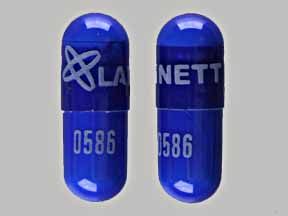
Dicyclomine Coupons & Savings Card – Discount Prices from $13.58
Generic for: Bentyl
Dicyclomine, also known as Bentyl, is a medication designed to relieve muscle spasms in the stomach and intestines for adults suffering from irritable bowel syndrome (IBS). It is an anticholinergic that functions by inhibiting a chemical called acetylcholine, which normally triggers muscle contractions in the digestive tract. By blocking this chemical, dicyclomine helps ease the discomfort associated with IBS. The medication is available in various forms, including tablets, capsules, liquid, and injectable options, with the oral forms typically taken four times a day. Common side effects may include dizziness, dry mouth, and blurred vision. Always consult with a healthcare professional before starting any new medication regimen.
Our coupons are free to use. Before paying, show the pharmacist your Dicyclomine savings card to get your free discount. Use our filters below to edit the prescription box to match your needs. The Dicyclomine prices will update based on your prescription needs. Above our Dicyclomine coupons, you can change your location to see pharmacy prices and costs in other areas. We're here to help you buy Dicyclomine at the lowest price with our prescription discount card.
My prescription
Edit
10MG, Dicyclomine (90 Capsules)
Select pharmacy

CVS
$22.01
COUPON PRICE
Walmart
$13.58
COUPON PRICE
Walgreens
$14.33
COUPON PRICE
Albertsons
$14.72
COUPON PRICEDicyclomine savings card
Show this card to your pharmacist
Walmart
$13.58
BIN
ID
PCN
GRP
019876
LHB12644DF
CHIPPO
LHX
Powered by
Dicyclomine, also known as Bentyl, is a medication designed to relieve muscle spasms in the stomach and intestines for adults suffering from irritable bowel syndrome (IBS). It is an anticholinergic that functions by inhibiting a chemical called acetylcholine, which normally triggers muscle contractions in the digestive tract. By blocking this chemical, dicyclomine helps ease the discomfort associated with IBS. The medication is available in various forms, including tablets, capsules, liquid, and injectable options, with the oral forms typically taken four times a day. Common side effects may include dizziness, dry mouth, and blurred vision. Always consult with a healthcare professional before starting any new medication regimen.
Our coupons are free to use. Before paying, show the pharmacist your Dicyclomine savings card to get your free discount. Use our filters below to edit the prescription box to match your needs. The Dicyclomine prices will update based on your prescription needs. Above our Dicyclomine coupons, you can change your location to see pharmacy prices and costs in other areas. We're here to help you buy Dicyclomine at the lowest price with our prescription discount card.
More prescriptions for irritable bowel syndrome
coupons from$7.29Save 87%
coupons from$79.46Save 91%
coupons from$81.34Save 89%
coupons from$7.29Save 85%
coupons from$37.11Save 69%
coupons from$1703.09Save 54%
coupons from$448.43Save 17%
coupons from$116.20Save 64%
More prescriptions for irritable bowel syndrome
Anaspaz Save 87%coupons from $7.29
Phenobarbital-belladonna Alk Save 91%coupons from $79.46
Phenohytro Save 89%coupons from $81.34
Levsin/sl Save 85%coupons from $7.29
Librax Save 69%coupons from $37.11
Viberzi Save 54%coupons from $1703.09
Zelnorm Save 17%coupons from $448.43
Alosetron Save 64%coupons from $116.20
Dicyclomine dosage forms
Use our Dicyclomine 10MG coupon with prices from $13.58 for 90 Capsules. You can also use our Dicyclomine 10MG coupon with prices from $2.62 for 1 Capsule. We have a Dicyclomine 10MG coupon with prices from $2.99 for 4 Capsules. You can use our Dicyclomine 10MG coupon with prices from $3.24 for 6 Capsules.
Dosage Quantity Price from Per unit 10MG 90 Capsules $13.58 $0.15 10MG 1 Capsule $2.62 $2.62 10MG 4 Capsules $2.99 $0.75 10MG 6 Capsules $3.24 $0.54 10MG 10 Capsules $3.73 $0.37 10MG 12 Capsules $3.98 $0.33 10MG 15 Capsules $4.35 $0.29 10MG 20 Capsules $4.96 $0.25 10MG 28 Capsules $5.95 $0.21 10MG 30 Capsules $6.19 $0.21
| Dosage | Quantity | Price from | Per unit |
|---|---|---|---|
| 10MG | 90 Capsules | $13.58 | $0.15 |
| 10MG | 1 Capsule | $2.62 | $2.62 |
| 10MG | 4 Capsules | $2.99 | $0.75 |
| 10MG | 6 Capsules | $3.24 | $0.54 |
| 10MG | 10 Capsules | $3.73 | $0.37 |
| 10MG | 12 Capsules | $3.98 | $0.33 |
| 10MG | 15 Capsules | $4.35 | $0.29 |
| 10MG | 20 Capsules | $4.96 | $0.25 |
| 10MG | 28 Capsules | $5.95 | $0.21 |
| 10MG | 30 Capsules | $6.19 | $0.21 |
| 10MG | 40 Capsules | $7.43 | $0.19 |
| 10MG | 50 Capsules | $8.66 | $0.17 |
| 10MG | 60 Capsules | $9.89 | $0.17 |
| 10MG | 100 Capsules | $14.82 | $0.15 |
| 10MG | 120 Capsules | $17.28 | $0.14 |
| 10MG | 180 Capsules | $29.58 | $0.16 |
| 10MG | 500 Capsules | $46.90 | $0.09 |
| 10MG | 1000 Capsules | $67.50 | $0.07 |
| 10MG | 9000 Capsules | $397.10 | $0.04 |
